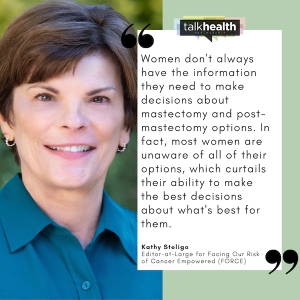talkhealth meets... Kathy Steligo

Kathy Steligo is a two-time cancer survivor, who has channelled her experiences into her career. Not only has she written five books outlining cancer treatment, pain management and treatment options, she is also Editor-at-Large for Facing Our Risk of Cancer Empowered (FORCE), the de facto voice of the hereditary cancer community.
Here, she answers our questions about the current state of breast cancer care and the myths surrounding mastectomy.
Tell me more about yourself and your history with breast cancer.
I was diagnosed when I was 42 and again when I was 51. I've had lumpectomies, biopsies, radiation therapy, bilateral mastectomies and twice had breast reconstruction.
You have interviewed hundreds of women who have survived, lived with and are living with breast cancer - what is the most interesting thing you have learnt?
That women don't always have the information they need to make decisions about mastectomy and postmastectomy options. In fact, most women are unaware of all of their options, which curtails their ability to make the best decisions about what's best for them.
What are breast reconstruction-myths that you want to bust?
- Everyone who has a mastectomy wants reconstruction. False. Many women choose to remain "flat" (without reconstruction).
- There is little choice about mastectomy/reconstruction: False. There are numerous methods/procedures of mastectomy and reconstruction.
- Nipples and areolas must be removed during mastectomy: False. Most women are candidates for nipple-sparing mastectomy.
- Only individuals diagnosed with breast cancer have mastectomy: False. Many men and women who have a very high risk of developing breast cancer due to their family history or an inherited genetic mutation have preventive mastectomy, with or without reconstruction.
- Reconstruction is only done with breast implants. False. New breasts can be recreated with a person's own tissue from their hips, back, thigh, buttocks or tummy.
- All breast reconstruction is the same: False. No single reconstructive method is right for every mastectomy patient. The method of reconstruction should be chosen by the patient and his/her surgeon, and tailored to their anatomy and priorities.
- All reconstruction results are the same. False. Results differ, depending on an individual's anatomy, his/her priorities, and their surgeon's skill.
Do you think education surrounding mastectomy and breast reconstruction has increased, or, is there still lots more work to do?
It has definitely increased in the US, and I suspect the same is true in the UK, however, we still have more work to do to provide all the education/information to people who are facing mastectomy.
What are your tips for someone who has just been told they need to undergo a mastectomy?
First, remember to breathe. Then understand that you have choices, which require making decisions. Learn about those choices and understand the limitations and benefits of each one before making your decision.
What are the different types of reconstructive surgery and why might specific people need to have them?
So many options with different length of surgery, recovery and so many other things to consider...that's why I wrote the book!
Information contained in this Articles page has been written by talkhealth based on available medical evidence. The content however should never be considered a substitute for medical advice. You should always seek medical advice before changing your treatment routine. talkhealth does not endorse any specific products, brands or treatments.
Information written by the talkhealth team
Last revised: 26 July 2024
Next review: 26 July 2026
